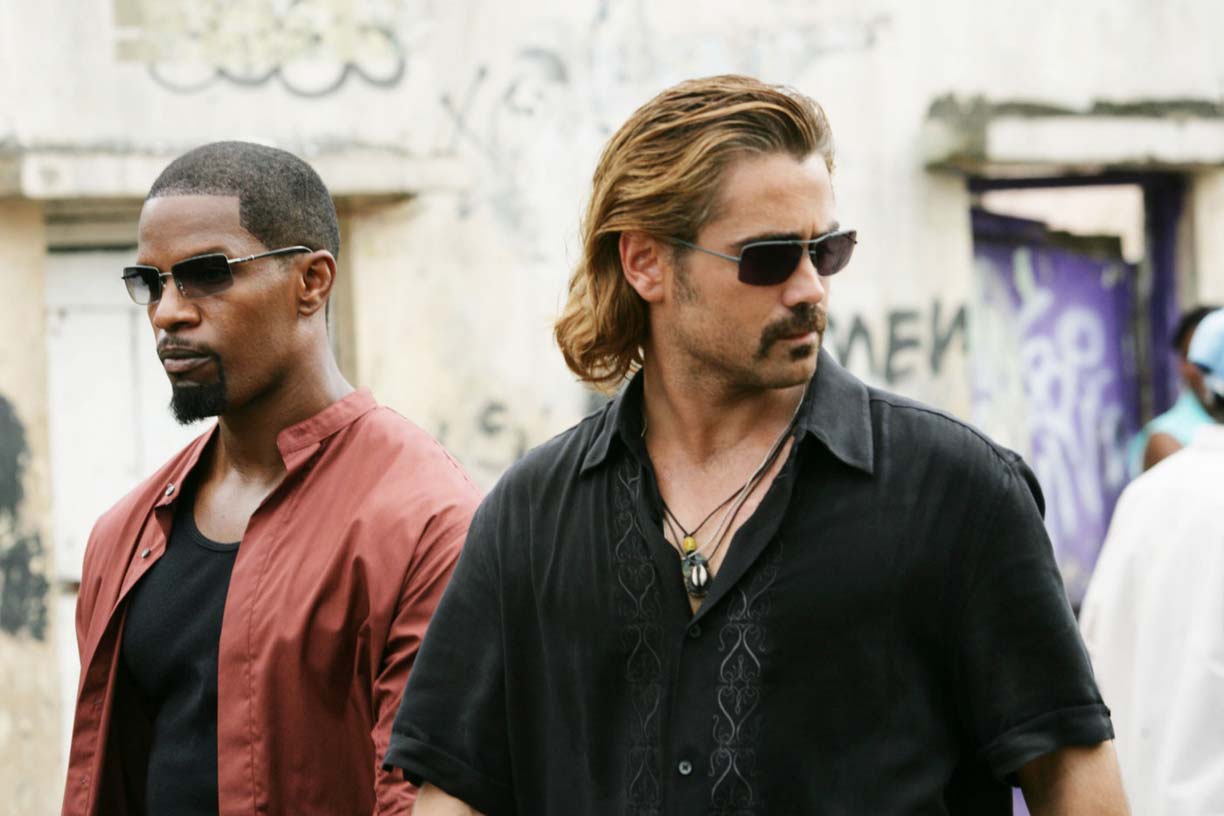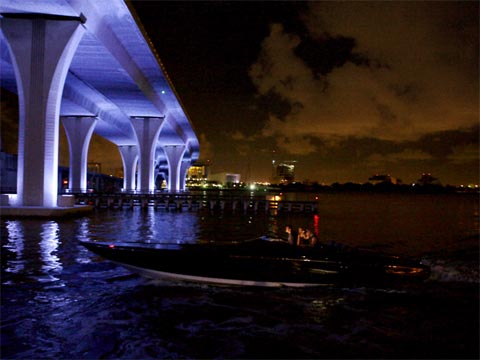IN DEPTH: What 'Miami Vice' Could Have Been
Have you ever wondered how different a movie could’ve turned out? About how different The Matrix trilogy would’ve been had Will Smith played Neo, or maybe how much better every single Keira Knightley film would be without her in it?
No film wracks my brain with more what-ifs and might-have-beens than Miami Vice, a film based off a police procedural series of the same name that debuted in 1984 on NBC. The series’ executive producer, Michael Mann, pitched the idea as a feature film, but couldn’t secure enough funding and adapted it for TV instead.
When a film version was announced and set for release in 2006, it drew considerable interest for two reasons: a highly iconic show with one of the best buddy cop duos of all-time, Crockett and Tubbs, was returning to screens; and it featured an A-list cast, including Colin Farrell, who was transitioning from action hero to serious actor with Alexander and The New World, and Jamie Foxx, whose ego was bursting in full bloom (more on that later) with a Best Supporting Actor nomination and a Best Actor win at the 2004 Oscars.
I was excited for very much the same reasons, but mostly because Mann was returning to direct. Mann had a flair for mixing realism with Hollywood dramatics -- like a pre-Christopher Nolan -- and his films always looked stylish with their midnight blues, orange sunrises and sharp, clean edges.
Dion Beebe, who previously worked with Mann on Collateral, and later won an Oscar for Memoirs of a Geisha, was also attached to the project. Set in a much more sleek and sensual Miami, with its pastel-coloured apartments quickly disappearing at the height of the city’s Manhattanization, Miami Vice had the potential to become another iconic crime drama, perhaps equal to or (dare I say?!) better than Heat.
But production was plagued with problems from the beginning, suffering delays and ultimately running over budget. Miami Vice was still a financial success when it was released, but received mixed reviews. Critics who liked it had Miami Vice near the bottom of their annual top ten lists, and those who disliked it trashed the film for its uneven pace, lack of on-screen chemistry and incomprehensible police mumbo jumbo.
Miami Vice was rather forgettable the first time I watched it, and I didn’t feel about it strongly either way. It failed to deliver on some promising aspects of the film, though it was later concluded that Mann could never deliver the project he originally envisioned.
What if Jamie Foxx’s ego didn’t rival the size of Mt. Everest?
As the story goes, after Ali wrapped up in 2001, Foxx pitched a Miami Vice film to Mann. It was an intriguing project, and was given the green light even before Mann and Foxx achieved critical acclaim with Collateral in 2004, which featured similar material with gunfights and ruthless villains. After consulting with Don Johnson, the original Crockett, Farrell was suggested and subsequently cast to star opposite Foxx.
At the time, Farrell was the bigger international star (Alexander grossed $133 million outside of North America, compared to Ray’s $49.5 million), and his salary reflected that. This was unacceptable to Foxx, and to be fair, his recent performances were much better than Farrell’s. But it just doesn’t sit well when the first African American actor to get two Oscar nominations in a year in white Hollywood gets paid less than an Irish import. "Good guy" Farrell was forced to take a “bit of” a pay cut, and according to IMDb, each took home $10 million.
But getting the same amount of pay wasn’t good enough for Foxx, and in his alpha-male-asserting glory demanded top billing over Farrell. Universal didn’t want to miss out on any international box office receipts or show complete favouritism towards Foxx, so as a compromise, gave him top billing for all American ads and stuck with Farrell in European ads.
When filming began in 2005, reports from the film’s set revealed uneasy working relationships and numerous production issues, most of them involving Foxx. Mann admitted that Foxx’s character was further removed from its original than Farrell’s, and even though Mann molded Miami Vice into the influential show it was, perhaps Foxx felt entitled as the guy who broached the idea in the first place.
Mann, who is an unrelenting perfectionist, openly clashed with Foxx, who refused to fly on commercial airliners or shoot scenes on boats or planes (yeah, good luck with that in Miami). Meanwhile, Mann’s dedication to real-life representations of police work and drug cartels also meant involving the entire production in real-life dangers.
In one instance, while researching for his role, Farrell was invited to participate in a sting operation with undercover cops. Guns were drawn during the sting and Farrell suffered from insomnia and anxiety that night. He was then told the next day that the whole thing was set up by Mann, to make sure Farrell experienced real emotions associated with police work. When gunshots were fired on set in the Dominican Republic, Foxx hauled ass back to America during a three-day suspension from filming.
And that was pretty much how filming for Miami Vice ended, as far as being a movie about America’s most awesome undercover police duo was concerned. Much of the script was repeatedly re-written in the middle of filming, which isn’t rare for a director like Mann who dislikes storyboarding. But Foxx’s “my life ain’t worth this shit” moment still forced Mann to change the ending (more on that later).
Farrell was having problems of his own, though, and checked into rehab shortly after filming for drug addiction. Without giving too much of the ending away, instead of an iconic shot of two macho men cementing a friendship of eternity, like in the series finale when Crockett and Tubbs throw their badges down on the pavement and drive off together in a stolen Ferrari, Farrell and Foxx are never seen together for the final 20 minutes of the film.
In fact, Farrell and Fox share so few memorable scenes together that Miami Vice ends up feeling like two separate films spliced into one. At the end of the film, Crockett and Tubbs’ relationship doesn’t feel any different because there’s no shared character arc, and it unfortunately becomes a story about cop co-workers rather than cop buddies.
Some scenes feel like Farrell and Fox are trying to one-up another, and the dialogue dissolves into a mess of cringe-worthy, drama queen-esque Hollywood tripe. (Case in point: near the beginning of the film, Farrell opens up some heavy plot exposition with this beauty: “Do you know the meaning of the word ‘foreboding’… as in ‘badness is happening right now’?” My god, blow those criminals away with that Oxford dictionary, Colin!)
Keep Reading This Post...
What if the original ending had stayed intact?
Going back to a point made previously – what was the original ending? Only Mann knows, but a lot of anonymous sources who worked on the film and a few Internet rumours suggest the original ending was much more dramatic. The theatrical ending is dramatic enough to feel a slight tickle in the tear ducts (though only for Gong Li), but it feels incomplete without a final shot of Crockett and Tubbs on the screen together, something the original ending would’ve included.
I thought Foxx was great in Ray and deserved the Best Actor, and Collateral is a good film, but I loathe him for ruining Miami Vice. Crime dramas tend to be shaky ground for Hollywood, though it seems to be an industry of its own in Asia. Not even mentioning John Woo’s work, Jackie Chan’s Hong Kong-based Police Story franchise, for example, has spawned three sequels, one spin-off, one standalone and a reboot.
If not for The Departed, which was (surprise) adapted from a Hong Kong crime thriller, Infernal Affairs, the highly overrated Training Day would be considered the decade’s best police crime film. Ugh. (Traffic was fantastic, but an ensemble film doesn’t fit the mold for the knight-in-shining-armour, save-the-princess type of plot.)
Why cast Gong Li?
Many critics praised Farrell and Li’s doomed love affair and on-screen chemistry, but I strongly disagree. It’s unfortunate that the film doesn’t do Li’s acting any justice, who was amazing in Raise the Red Lantern and Shanghai Triad, both Chinese-language films.
Li reportedly struggled with her English and Spanish lines, which she had anticipated and contributed towards her reluctance in making Hollywood films throughout her illustrious career. It’s difficult for foreign actors, especially ones from Asia, to emulate the natural speaking rhythms of native English speakers, especially since Chinese and English are such different languages.
Mann went through huge efforts to have Li and Farrell’s affair play a big role in the film, but their lack of chemistry (even with a steamy sex scene) and Li’s stilted performance doesn’t deliver the fireworks that are promised. Perhaps the character itself was flawed, but it’s rare for Farrell to not to be able to establish chemistry with the female lead.
Why didn’t Jan Hammer do the soundtrack?
The original Miami Vice theme (and much superior “Crockett’s Theme”) is iconic, and its composer, Jan Hammer, is a well-known synth keyboardist who’s worked with Mick Jagger and Carlos Santana. Mann wanted to distance the film from the series, which is understandable given how much Miami has changed. But Mann downgraded from Hammer’s award-winning soundtrack to mediocre covers of outdated songs, including Phil Collins’ “Into the Air Tonight.” It’s a minor hiccup, since Scottish post-rock band Mogwai’s “Auto Rock” was such a great melody to end the film with, but dammit, what could’ve been, right?
“I didn’t like [Miami Vice] so much,” said Farrell in Total Film. “I thought it was style over substance… I think we missed an opportunity to have a friendship that also had some elements of fun.” Made 22 years apart, the two versions of Miami Vice offered entertainment to two distinct generations, but the friendship between Crockett and Tubbs seemed to last just one.
In the DVD commentary, Mann admits that even though he tried to distance the film from the series, it was impossible to do so because the series was so iconic and meant so many different things to different people, from its popularization of boat shoes and Ray-Bans to its depictions of white flight and Little Haiti in 1980s Miami.
There’s a distinct, American feel to Mann’s films, partly because no one captures the skylines of urban America such as Los Angeles and Miami better than him. While Miami is far from being considered one of the world’s most attractive cities, Mann makes its shipping containers and skyscrapers look alive, as if all of its tall, reflective surfaces are constant hiding places for elaborate heists and dual identities. Miami Vice had the right cast and crew to deliver an American classic, an epic crime drama that represented a modernized cowboy genre with rugged cops hunting down the world’s Pablo Escobars, but unfortunately the film delivers on far too few scenes.
Score:
In a rare instance, the theatrical version is actually stronger than the director’s cut. The film’s beauty lies in its style, not substance, but it’s still a strong installment in an underrepresented cops-and-robbers category.
Miami Vice needed more than just a better ending to be considered a significantly better film, because it falls short in so many other areas. There’s still not enough to feel like the material itself is good enough to overtake Heat, but it could’ve been pretty close.
-
About the Author:
Jason Chen is a Canadian writer. You can find his sports-focused work on Rotowire and Hockey's Future. More of his articles on movies can be found here. He's also been known to tweet (sometimes a lot).
-








